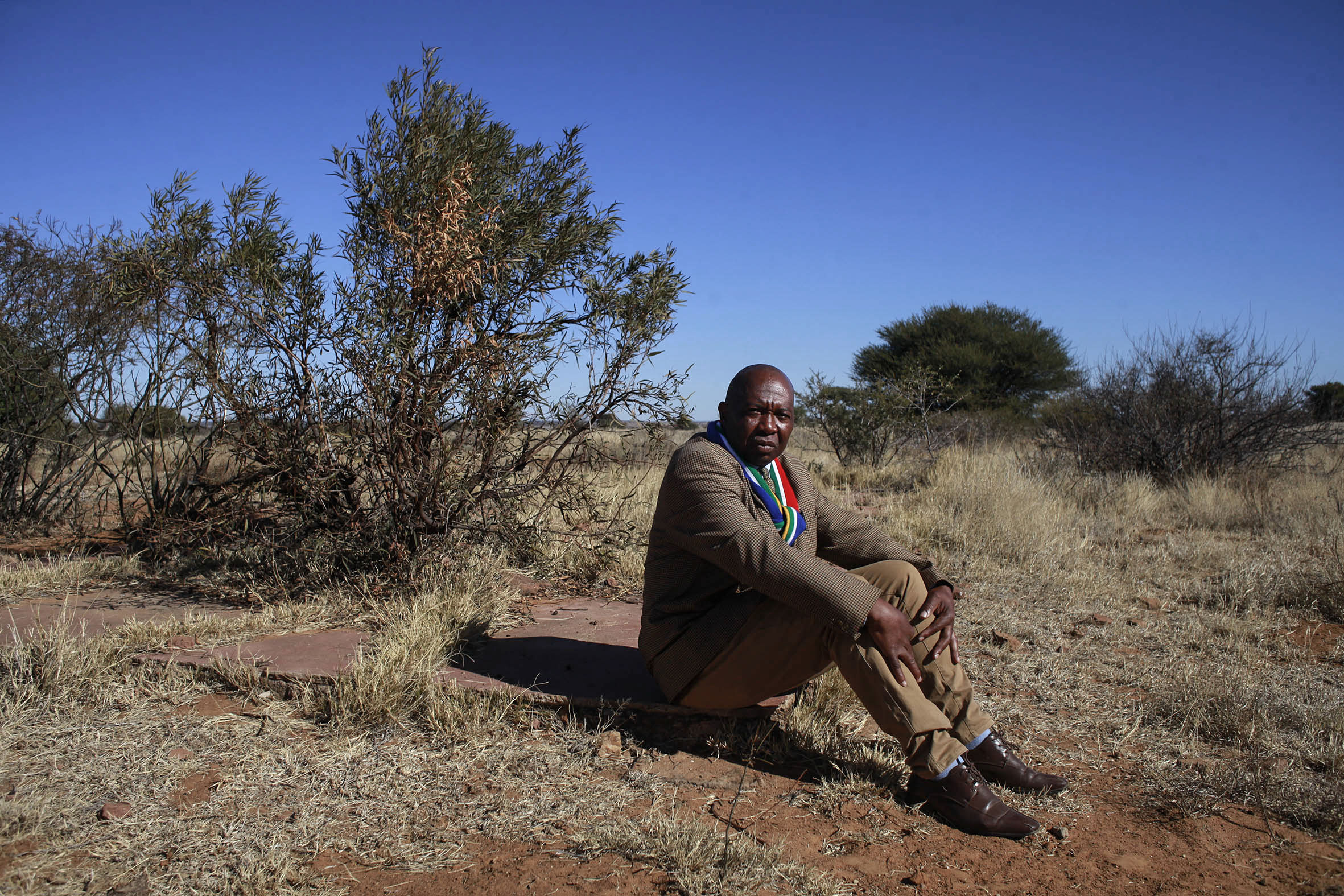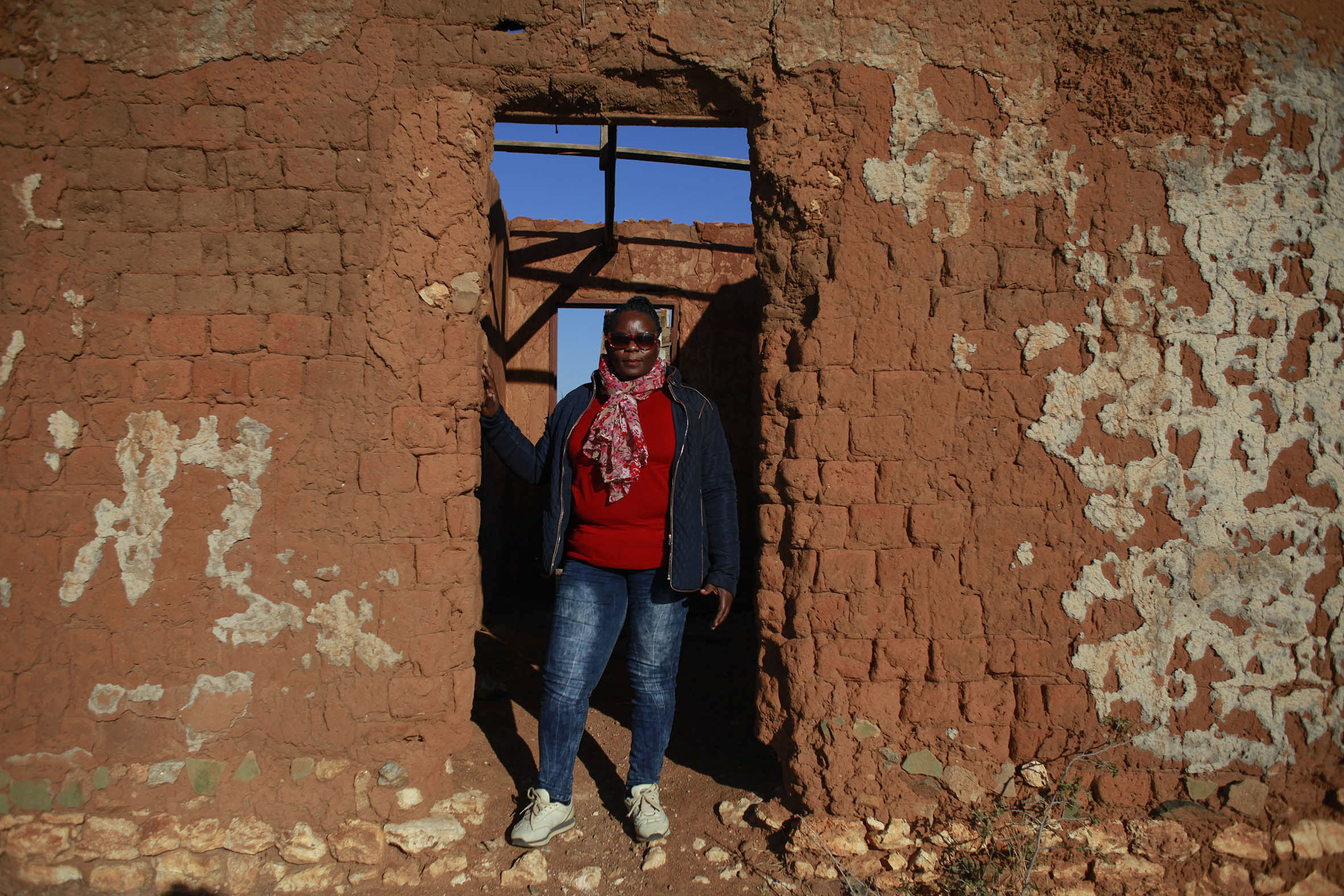Bitter fruit: The father of Didimalang Lorato Molebatsi confronted Bophuthatswana president Lucas Mangope when he took the family’s land
When the iron grip of Lucas Mangope over the Bophuthatswana homeland was broken, Nelson Mandela said: “We have now forgotten about him. He belongs to the past.”
But the past seeps into the present and many Mahikeng locals still taste the bitterness of Mangope’s name, inked on their lips.
Didimalang Lorato Molebatsi (64) looks outside the car window as the landscape rushes past and winter’s naked trees blur into one.
“The land my family once had belonged to my outata, who was my father’s grandfather,” she says and then falls silent.
The car kicks up red dust as it struggles to navigate the troughs that have formed in the gravel road. Tontonyane village feels eerily quiet. A few children are walking along the paths connecting gravel and tar road and an old man, wrapped in a faded green jersey, is taking a late afternoon stroll near the dam.
As the glare of the sun starts to weaken and the cool breeze off the water sharpens, Molebatsi points at two silo-shaped towers in the distance, which form part of the Mmabatho sewerage station.
“Outata divided the land among all his children and one son was given land where that sewerage is now, but they were removed in 1977.”
The Unit 13 residential area is now on the land that Molebatsi’s father inherited. The family were subsistence farmers until they too were kicked off their land by the homeland regime.
“When Mangope took our land, my father got very angry. He wasn’t one to scare easily so he went to him and told him to stop taking his land. Mangope was powerful and a dictator so he stared my father down and answered: ‘What land? What do you even know about land?’ During those times, you had no say. Your words held no value. So my father resigned himself to the forced removal.”
Inside her home, Molebatsi leans back into her couch and says: “People just come here and remove you from the land that raised you without giving you a single penny or even telling you a thing.
“It was so painful when these people came and just kicked us off our land. Did you see how healthy that soil is? We used to harvest fresh mielies. And sunflowers with heads as big as mine used to grow here.”
She remembers how the soldiers who removed them treated her father, her hero.
“The most painful thing was seeing my dad’s dignity die because of the way they spoke to him, as if he was nothing, in front of us as children. Ne go le maswe. It was so ugly and painful.”
Molebatsi’s health will not allow her to attend the public hearings on reviewing section 25 of the Constitution, which addresses property ownership. She supports expropriation of land without compensation but says the land and its title deeds must go back to the people and not to government or chiefs.
Matthews Maphangela (56) attended the hearing in Mahikeng on Wednesday but ended up leaving halfway through because it was “too disorganised” and he saw that he wouldn’t have a chance to speak.
 [The land that once belonged to Matthews Maphangela’s parents was also taken. (Oupa Nkosi)]
[The land that once belonged to Matthews Maphangela’s parents was also taken. (Oupa Nkosi)]
He is opposed to land expropriation without compensation because he believes that expropriated land loses its value.
“How do you go to a bank and say, look, I need help so I can work my farm when the land has no value? If you go to the deeds office, you’ll find that an Afrikaner farmer has many loans and that the land was used as security. Do you then inherit all these problems? How will it work?”
He also believes it won’t work because there is no proper plan to guide the process, which he believes will allow for corruption by government officials and individuals.
Tightening the knot in his South African flag scarf, Maphangela says that his family owned prime land near what is now the Mahikeng airport but they were forcefully removed by the Bophuthatswana government in 1983.
Many families submitted land claims and the state agreed to give R261 000 per household but Maphangela refused this offer.
“This amount is too little. Just imagine. There are people that took this money because they were told ‘you are going to die soon because you’re old; just take it’. If I die then it’s fine because it will be my time. I won’t just accept anything that comes.”
At first glance, the land around the airport looks like any other piece of empty land. On closer inspection, the remains of a foundation of the Maphangela main house can be seen. Walking on the land of his ancestors, Maphangela points out where the cattle and goat kraals once stood, where mounds of rocks mark the graves of family members and where a deep hole in the ground was dug for water.
“The water that came from this well was fresher than bottled water, I tell you. I used to come here every morning to get water for the animals, and at that time we had more than 200 goats,” Maphangela says, looking into the distance with a slight smile that quickly fades.
“I won’t be able to sleep tonight because I came here,” he says, kicking small pebbles on the ground. “The last time I came here to this land, I had dreams of my oumama the whole night. I would see my grandmother’s face and, even after getting out of bed and walking around, her face would come back the moment I fell asleep again. The whole night.”
Former ANC councillor Gaasite Legalatladi (45), who is also from Tontonyane, has dedicated herself to educating Mahikeng people about property rights and how they can file land claims.
 [Gaasite Legalatladi stands in the ruins of her grandfather’s home. (Oupa Nkosi)]
[Gaasite Legalatladi stands in the ruins of her grandfather’s home. (Oupa Nkosi)]
A document revealing that a kgosi of the Barolong had given land to the Bophuthatswana government is what got her interested in learning more about the dispossession of land, including that of her family.
“Chiefs and kings are custodians of land and not landowners themselves, which is a song we have been singing as a community for so long. How can they give away our land without our consent and with no consultation?”
Legalatladi talks of how things were before the land was taken. “The land was used go lema masimo and this ploughing of the fields would give us all kinds of fresh food. We also used the land for cattle grazing and, despite there being no fences, each family knew which land was theirs and how many hectares they owned. But now, we can no longer live this way because we don’t have the land.”
Since the forced removals, Legalatladi and others have filed land claims, which she says were dismissed by the department of rural development and land reform. They are waiting for the outcome of their latest land claim.
“We want our land back. Politics has delayed everything because of the interests of individuals who want the land for themselves.”
Legalatladi also supports the expropriation of land without compensation.
“Government already has so much land that is not being used to benefit black people. Why does it need more? Let the land return to the people.”